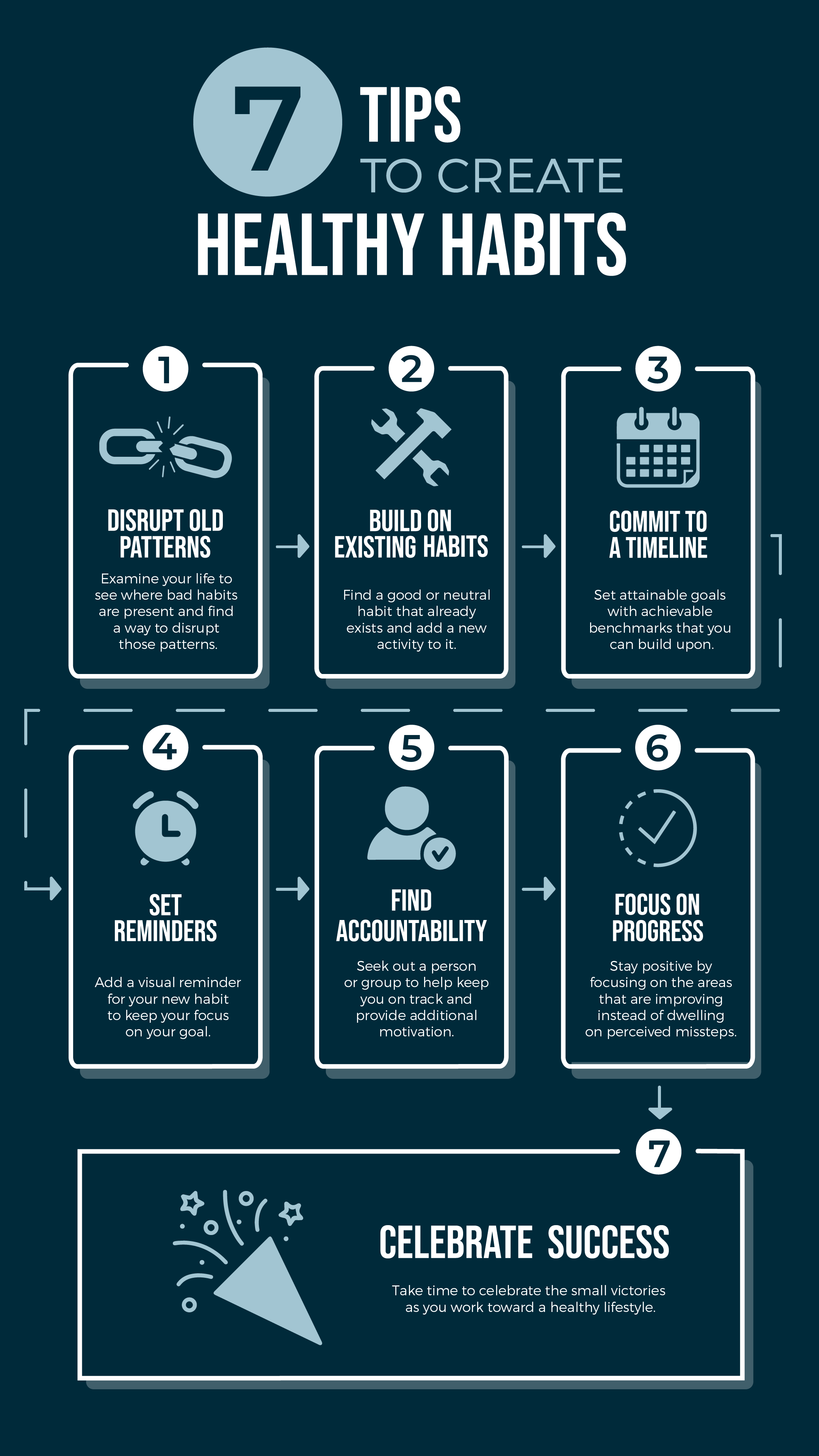7 Tips to Create Healthy Habits

When it comes to our health, the things we do on a daily basis make a significant and lasting difference. But, making the choices that support a healthy lifestyle can feel next to impossible.
Why is it so hard to implement changes that enhance our well-being?
According to the Mayo Clinic, the answer is more straightforward than you think: we are creatures of habit. Making a change to our existing habits takes time and intention. Think back to when you were learning a new skill, like driving — you had to make a conscious effort to remember to do things, like using your blinker, that are now second nature.
The same conscious effort is required to create healthy behaviors. Maintaining a healthy lifestyle requires effort and patience, but it can become as habitual as brushing our teeth. Our top seven tips for success will help you overcome the common pitfalls we all encounter when building healthy habits.

1 - Disrupt Old Patterns
The NIH comments that “repetitive behaviors that make you feel good can affect your brain in ways that create habits that may be hard to change”. Therefore, the first step towards changing your behavior and building a healthier life is to examine your current habits and routines.
Take a few days to write down areas of your life that you feel contribute to poor health. Then, look for the patterns in your routine and think about a way to disrupt the negative action and replace it with positive action or remove the temptation. For example:
- If you find yourself overeating at family-style dinners, try serving your food in the kitchen instead of on the table.
- If you watch tv right before bed every night, which can impair your quality of sleep, try reading a book instead and/or removing the tv from your bedroom.
By disrupting your old patterns, you allow your brain to replace bad habits with good ones.
2 - Build on Existing Habits
Not all habits and patterns are good or bad. Some things you do every day, like checking the mail or pouring a cup of coffee, are just a part of life. One way to build on your existing habits is to take these neutral actions and add a positive step, such as physical activity.
The method of building on an existing habit is known as habit stacking and it works with the way your brain naturally makes connections. You already have many daily habits you practice without realizing. You benefit from that solid neural network built from years of habitual action by stacking a healthy habit with one of these neutral activities.
To build on your existing habits, use the formula “After/Before [CURRENT HABIT], I will [NEW HABIT].” Your actions should be clear and precise to help avoid confusion in the future. For example:
- After I put my dishes from breakfast in the dishwasher, I will drink one glass of water.
- After I brush my teeth in the evening, I will meditate next to my bed for one minute.
- Before I open the mailbox door, I will walk around the block for five minutes.
- Before I lay down in bed at night, I will stretch next to my bed for five minutes.
Habit stacking takes time to change behavior, but this method makes habits that stick in order to help you have a healthy lifestyle.
3 - Commit to a Timeline
The habit-forming process is most effective when you have a timeline in place. Start by setting reasonable goals with an attainable deadline. Next, you want to select a plan that you can achieve and puts you on the path for a more significant accomplishment. For example:
- If you want to eat a healthy diet, start with establishing the habit of “before I eat a bowl of cereal in the morning, I will eat three bites of fruit.”
- If you want to exercise more, start with establishing the habit of “after I close my laptop for lunch, I will use my rower for five minutes.”
Give yourself a deadline to implement change that isn’t daunting, such as: in three weeks, I will eat three bites of fruit every single day. Once you reach the first deadline, add a new goal that builds upon your accomplishment.
4 - Set Reminders
You can never create successful habits if you keep forgetting to practice. So while the habit stacking method is a great tool to aid in remembering your new behavior, it also helps to have visual reminders.
Setting a few different reminders can help as you work on your habit formation. Reminders can be anything from a sticky note on the bathroom mirror to putting your workout clothes next to your bed at night.
Try to set a reminder that will help you with your specific goal. For example, if your habit is to drink a glass of water after putting your breakfast dishes away, a great reminder is to put a sticky note on your dishwasher.
Visual reminders may not be the most beneficial for everyone. You can also set time or location reminders on your phone or set an alarm.
5 - Find Accountability
Research has demonstrated that the physical fitness levels of those around us impact our effort when working out. You are more likely to push yourself hard if you have a partner that is pushing, too. Your effort during workouts isn’t the only area you can benefit from an accountability partner.
An accountability partner can improve your commitment to your goal. When we are alone, we have all the room in the world to skip that early morning workout or eat dessert for dinner. But when we’re accountable to someone else, we have a little extra motivation to be consistent, not to mention additional support when we feel like giving up.
6 - Focus on Progress
There is a quote attributed to Voltaire, “the perfect is the enemy of the good.” Often when we are looking to build healthy habits, we get lost in the pursuit of perfection. When we don’t live up to our expectations, we give up on the pursuit altogether.
Lasting change takes time, and you will forget a workout or overindulge at a party. It can be tempting to give up when you feel like you failed in some way. Don’t get stuck on a perceived misstep, but instead, focus on what you have achieved and adjust your deadlines when needed.
7 - Celebrate Success
One of the ways to focus on your progress is to celebrate the small wins or achievements as you work towards your greater goal. Every time we recognize the accomplishment of a goal — no matter how small — our brains release dopamine as a reward and this, in turn, spurs motivation.
The positive reinforcement of reaching goals reiterates the importance of working towards stackable, attainable healthy habits. For example, you may dream of being a marathon runner but if you haven’t run in a year, make sure you celebrate the accomplishment of ten minutes on the treadmill three days a week.
Enjoy Your Healthy Habits
Making healthy choices doesn’t need to be a chore; it can be as habitual and easy as brushing your teeth if you make some simple changes to set yourself up for success.
It is easier to start the process by disrupting your old patterns and building on your existing habits. A reasonable timeline, reminders, and accountability will provide you with the structure and support you need to make changes. In addition, focusing on your progress and celebrating every success give you the psychological support you need to sustain your new healthy lifestyle.
New to Echelon? As we discussed, accountability plays a significant role in the success of habit formation. The Echelon community is full of people seeking to engage in healthy activities and who support each other along the way. Join our community to find your next accountability partner!


























